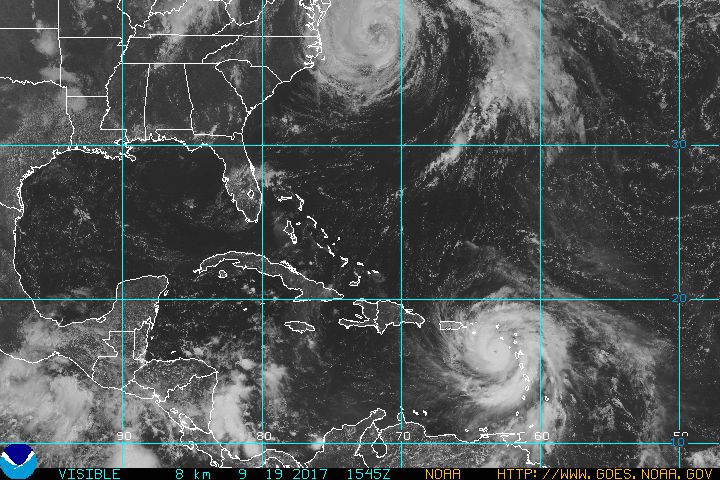U.S. civilian and military disaster responders pulled back from the U.S. Virgin Islands at the approach of Hurricane Maria, expected to make landfall Tuesday night into Wednesday on Puerto Rico.
The hurricane overran Dominica, where prime minister Roosevelt Skerritt described “mind-boggling” damage to the island of 72,000 residents. The National Hurricane Center said Maria had maximum winds of 160 mph when it hit, and quickly regained category 5 strength after passing the island.
At 5 p.m. Tuesday the hurricane center predicted the storm core would move near or over St. Croix -- which had escaped the worst that Hurricane Irma inflicted on the USVI -- and then Puerto Rico. On its forecasted path across Puerto Rico the storm could have sustained winds of 130 mph and peak gusts of 150 mph, said NHC forecasters.
Navy and Coast Guard vessels brought relief workers out from the Virgin Islands, pausing the response and recovery for Hurricane Irma’s massive damage on St. Thomas and St. John. Coast Guard forces hunkered down at San Juan, P.R., where the port was closed at 8 a.m. Tuesday and refugees from Hurricane Irma still filled city hotels.
In the Florida Keys hard-hit by Irma, Key West was the last Florida port to re-open, and the Coast Guard established a temporary regulated navigation area and safety zone Saturday.

Wrecked boats along a shoreline near the Navy's Key West air station. Coast Guard photo.
Vessels within one nautical mile of land in the Keys must operate at a slow speed, and keep a distance of 25 yards around law enforcement vessels, salvage vessels, or visible wreckage. The emergency rule is in effect through 8 a.m. Oct. 1.
The Texas energy industry is continuing its recovery from Hurricane Harvey. Three weeks after the storm shut down refineries, there are expectations that Valero and Total will resume operations this week at their Port Arthur refineries, while Exxon Mobil is preparing to reopen its Beaumont facility.
Colonial Pipeline said Monday that the refiners can use their own booster pumps to move product into Colonial’s Port Arthur line, while the pipeline company continues repairs to its own pump equipment.
Colonial is a major conveyor of gasoline to the East Coast states. The disruption caused by Hurricane Harvey — followed by Hurricane Irma’s path up the Florida peninsula — severely affected fuel supplies in the Southeast states and contributed to the biggest wholesale price bump in two years.




